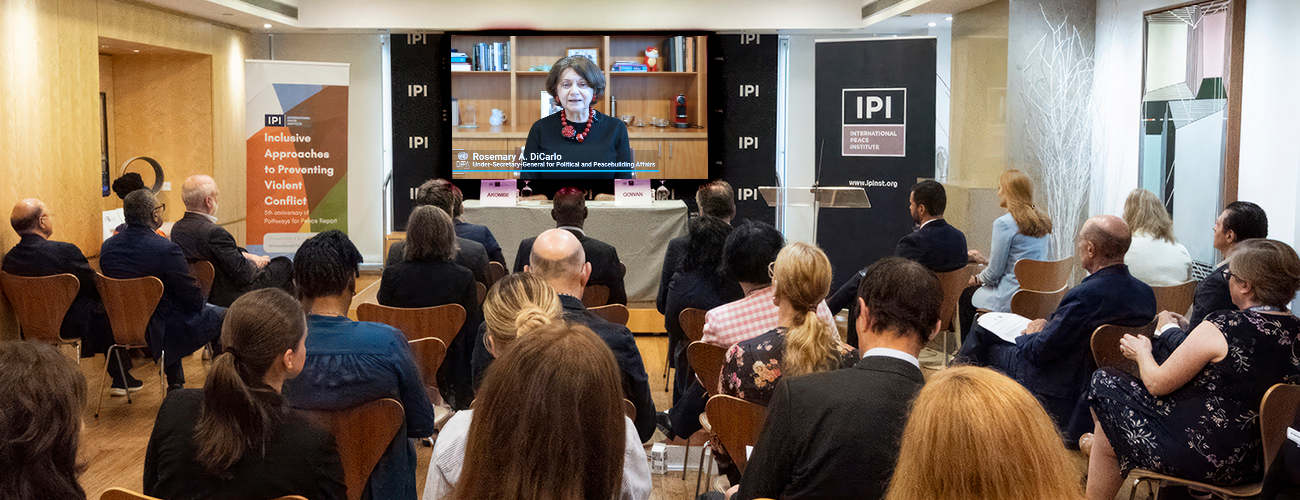Spring 2023 marked the fifth anniversary of the publication of the flagship UN-World Bank report “Pathways for Peace: Inclusive Approaches to Preventing Violent Conflict.” The report reviewed conflict trends, drew lessons from emerging research, including growing evidence on the importance of addressing patterns of exclusion and inequality, and building on 19 case studies, identified lessons of successful national prevention efforts. The report also made recommendations for ways to strengthen the international prevention architecture, including early warning and early response. Over the past five months, the UN and the World Bank have benefited from a series of reflections from Member States, think tanks, civil society, and multilateral and regional partners on the relevance of the findings of this report.
On June 26th, in partnership with PBSO and the World Bank, IPI cohosted a policy forum entitled “Inclusive Approaches to Preventing Violent Conflict: 5th Anniversary of Pathways for Peace Report,” to reflect and discuss its contemporary significance and ways forward for prevention and peacebuilding in rapidly evolving global and regional contexts. During opening remarks, Farhad Peiker, Acting Special Representative to the UN World Bank Group, highlighted several noteworthy advancements catalyzed by the report. These advancements include a notable shift in the perceptions of fragility, conflict, and violence within the World Bank, UN, and other institutions. Acknowledging that these issues pose critical developmental obstacles that threaten efforts to alleviate extreme poverty in both low- and middle-income countries. The influence of the Pathways for Peace initiative has prompted the World Bank to actively incorporate and prioritize the integration of the concept of a “livable planet” into its core mission and vision, while still prioritizing the eradication of extreme poverty.
The Pathways for Peace initiative has produced a series of papers as well as consultative workshops and digital exchanges hosted by the Cairo Center (CCCPA), the UN Economic and Social Commission for Western Asia (ESWCA), the International Dialogue for Peacebuilding and Statebuilding (IDPS), the Norwegian Institute of International Affairs (NUPI) and the Quaker UN Office. Kavita Desai, Quaker UN representative outlined some significant opportunities to strengthen the international architecture: First is the New Agenda for Peace which presents the opportunity to enhance peacebuilding and prevention, and incorporate innovation which can help put prevention back at the heart of the UN’s work; Second is the follow-up to last year’s resolution on financing for peacebuilding which creates space to achieve more prevention-focused financing strategies that also offer the flexibility to improve evidence bases and be informed by civil society; Third is strengthening existing data tools and coordination among them, including monthly regional reviews along with recovery peacebuilding assessments, early warning mechanisms and other analytical tools.
In the second session, participants focused on identifying and addressing the shortcomings of the Pathways for Peace report, particularly with regard to issues of exclusion and inequality. H.E. Arlene B. Tickner, Deputy Permanent Representative of Colombia to the UN, drew on her academic expertise to shed light on these gaps, highlighting the case of Colombia’s peacebuilding efforts as an illustrative example. Participants also engaged in a comprehensive discussion on various approaches to peace and the different methodologies to measure it. IPI Senior Adviser Youssef Mahmoud played a crucial role in facilitating the latter part of the discussion, stressing the importance of moving beyond the restoration of norms and instead emphasizing the need for their transformation.
Overall, the event distilled some of the lessons of these reflections, identified critical outcomes for prevention and peacebuilding, and provided a hybrid space to discuss future opportunities to reinforce shared prevention and peacebuilding lessons in rapidly evolving global and regional contexts.
Welcoming/Closing Remarks:
Adam Lupel, Vice President and Chief Operating Officer, International Peace Institute
Farhad Peikar, Acting Special Representative to the UN, World Bank Group
Elizabeth Spehar, UN Assistant Secretary-General for Peacebuilding Support
Asif Khan, Director of Policy and Mediation Division, UN Department of Political and Peacebuilding Affairs
Franck Bousquet, Deputy Director, Fragile and Conflict-affected States, International Monetary Fund
Speakers/Moderators:
Roselyn Akombe, Chief of Peacebuilding Strategy and Partnerships, UN Department of Political and Peacebuilding Affairs
Adam Day, Head of the Geneva Office, United Nations University Centre for Policy Research (virtual)
Richard Gowan, UN Director, International Crisis Group
H.E. Arlene B. Tickner, Deputy Permanent Representative of Colombia to the UN
Saji Prelis, Child and Youth Programmes, Search for Common Ground
Youssef Mahmoud, Senior Adviser, International Peace Institute
Discussants:
Representatives from the Cairo Center for Conflict Resolution, Peacekeeping and Peacebuilding (CCCPA), UN Economic and Social Commission for Western Asia (ESCWA), International Dialogue on Peacebuilding and Statebuilding (IDPS), Norwegian Institute of International Affairs (NUPI) and Quaker UN Office








